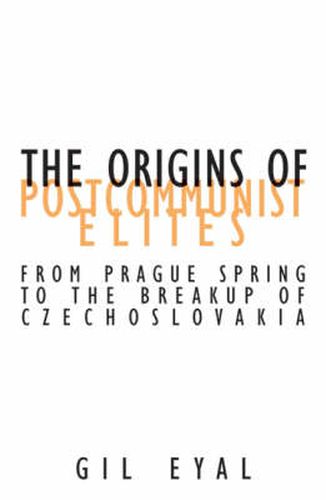Readings Newsletter
Become a Readings Member to make your shopping experience even easier.
Sign in or sign up for free!
You’re not far away from qualifying for FREE standard shipping within Australia
You’ve qualified for FREE standard shipping within Australia
The cart is loading…






How is it that Czechoslovakia’s separation into two countries in 1993 was accomplished so peacefully-especially when compared with the experiences of its neighbors Russia and Yugoslavia? This book provides a sociological answer to this question-and an empirical explanation for the breakup of Czechoslovakia-by tracing the political processes begun in the Prague Spring of 1968.
Gil Eyal’s main argument is that Czechoslovakia’s breakup was caused by a struggle between two fractions of what sociologists call the new class, which consisted primarily of intellectuals and technocrats. Focusing on the process of polarization that created these two distinct political elites, Eyal shows how, in response to the events of the ill-fated Prague Spring, Czech and Slovak members of the new class embarked on divergent paths and developed radically different, even opposed, identities, worldviews, and interests. Unlike most accounts of postcommunist nationalist conflict, this book suggests that what bound together each of these fractions-and what differentiated each from the other-were not national identities and nationalist sentiments per se, but their distinctive visions of the social role of intellectuals.
$9.00 standard shipping within Australia
FREE standard shipping within Australia for orders over $100.00
Express & International shipping calculated at checkout
How is it that Czechoslovakia’s separation into two countries in 1993 was accomplished so peacefully-especially when compared with the experiences of its neighbors Russia and Yugoslavia? This book provides a sociological answer to this question-and an empirical explanation for the breakup of Czechoslovakia-by tracing the political processes begun in the Prague Spring of 1968.
Gil Eyal’s main argument is that Czechoslovakia’s breakup was caused by a struggle between two fractions of what sociologists call the new class, which consisted primarily of intellectuals and technocrats. Focusing on the process of polarization that created these two distinct political elites, Eyal shows how, in response to the events of the ill-fated Prague Spring, Czech and Slovak members of the new class embarked on divergent paths and developed radically different, even opposed, identities, worldviews, and interests. Unlike most accounts of postcommunist nationalist conflict, this book suggests that what bound together each of these fractions-and what differentiated each from the other-were not national identities and nationalist sentiments per se, but their distinctive visions of the social role of intellectuals.